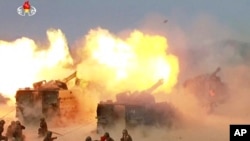The White House said Wednesday that North Korea is secretly supplying Russia with artillery for the war in Ukraine, another worrying sign, analysts say, that this conflict is getting more complex and dangerous for Ukrainian civilians.
“Our information indicates that the DPRK is covertly supplying Russia's war in Ukraine with a significant number of artillery shells, while obfuscating the real destination of the arms shipments by trying to make it appear as though they're being sent to countries in the Middle East or North Africa,” John Kirby, spokesman for the National Security Council, told reporters.
Kirby added that the artillery shells North Korea is sending are “not going to change the course of the war,” and that U.S. security support for Ukraine will continue and adapt to new challenges.
Russia also has bought arms from Iran, in violation of a U.N. resolution that forbids weapons sales from the pariah nation, he said, adding that the U.S. would approach the U.N. to try to hold Russia accountable.
North Korea has denied sending weapons to Russia.
"We have never exported weapons or ammunition to Russia before, and we will not plan to export them," an official at the North Korean Defense Ministry's General Bureau of Equipment said in a statement carried by the official Korean Central News Agency on September 21.
Defense analysts agreed with Kirby’s assessment that the new munitions won’t lead to a Russian victory, but say they are nevertheless a threat in the hands of an army accused of targeting Ukrainian civilians.
“What North Korea is providing to Russia is older, unguided artillery shells,” said Ian Williams, deputy director of the Missile Defense Project at the Center for Strategic and International Studies. “So, the kind that you essentially fire just based on the ballistic trajectory, and it will kind of land where it may. You need a lot of them to really have an impact. But if you're just firing them indiscriminately into a civilian area, or you're just trying to blanket a large area, it can suffice in certain circumstances.”
And, he said, the North Korean munitions aren't as worrying as Iran’s decision to supply small, portable, hard-to-detect drones to Russia. Those were used last month to batter Kyiv, the capital.
“I'm actually more concerned with what the Iranians are doing than what the North Koreans are doing,” Williams said. “The Iranians are providing them with quite-long-range missiles and drones, and lots of them. And they are starting to really bear down using these things to really wear down Ukraine's civil infrastructure, their electrical grid and water treatment plants, and the ability to deliver fresh water to urban areas. I have been somewhat alarmed by the persistence of the Russians in this effort.”
Kirby also said the transaction indicates that Russian President Vladimir Putin is struggling in the eight-month conflict. Analysts say the war is going poorly for Russia, with Ukraine’s government estimating that as many as 70,000 Russian soldiers have been killed.
“It's a sign both of the isolation that he continues to feel economically,” Kirby said. “His own defense industrial base can't keep up with the pace at which he is using armaments in Ukraine. But it's also a sign of how much he's doubling down on continuing this war, that he's willing to go outside the lifelines, as it were, to find foreign suppliers.”
Williams added that it’s possible emotion is driving some of Russia’s military decisions.
“My belief is that Russia has lost this war, and they are just like the Germans in World War II, continuing to fire V1s and V2s at London,” he said. “By the end, it was not for any strategic purpose. It was just vengeance and trying to make the British people suffer.”
Putin has expressed his unhappiness about South Korea’s decision to support Ukraine. The two Koreas remain in a state of war, nearly 70 years after the formal cessation of hostilities.
On Wednesday, North Korea fired at least 23 missiles into the sea, some toward its southern neighbor.
"We have learned now that the Republic of Korea has decided to supply weapons and ammunition to Ukraine,” Putin said last week at a meeting of international policy experts in Moscow, using South Korea’s official name. “This will be destroying our relations. How would the Republic of Korea behave if we resumed cooperation with North Korea in this area? Would you feel happy about this?”
Editor's note: A previous version of this story incorrectly named the German weapons used in World War II. They were V1 and V2 rockets.




